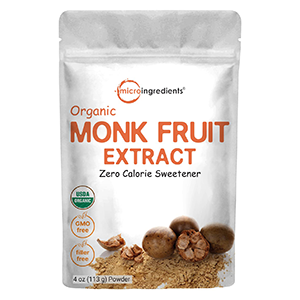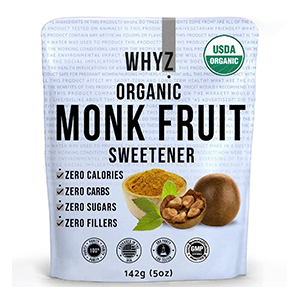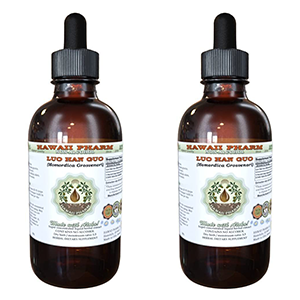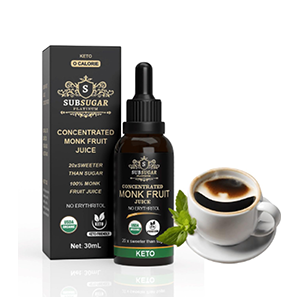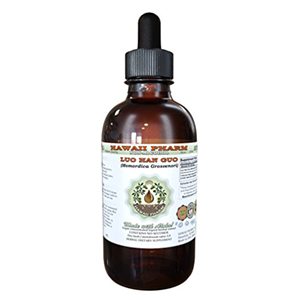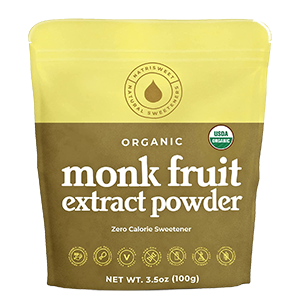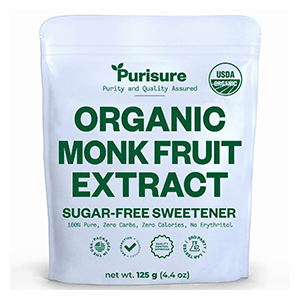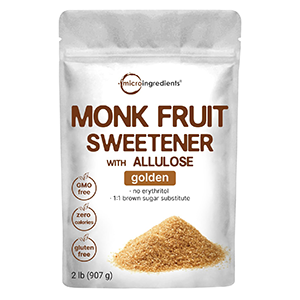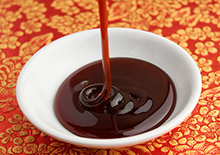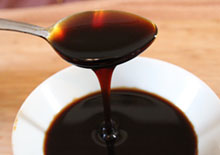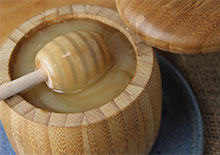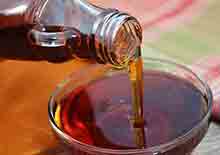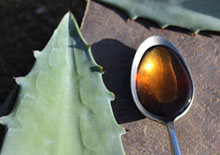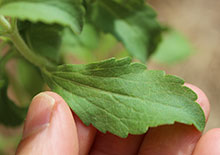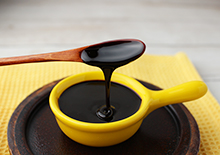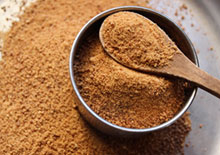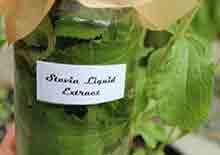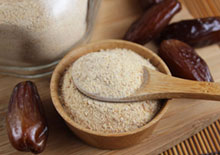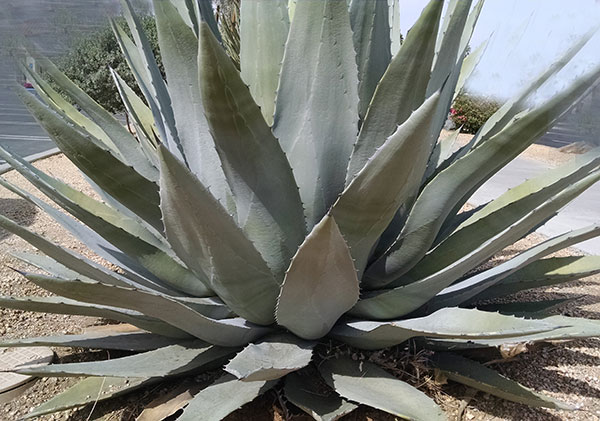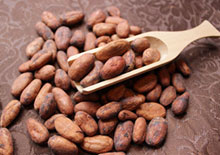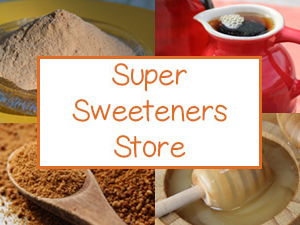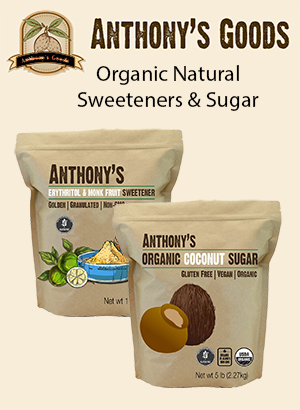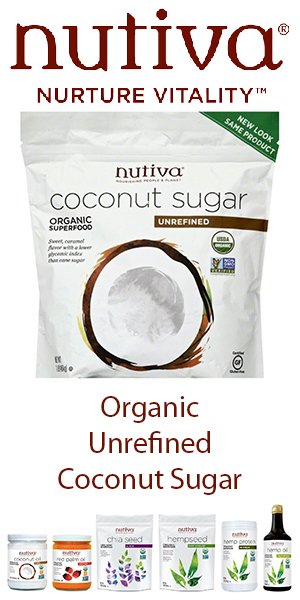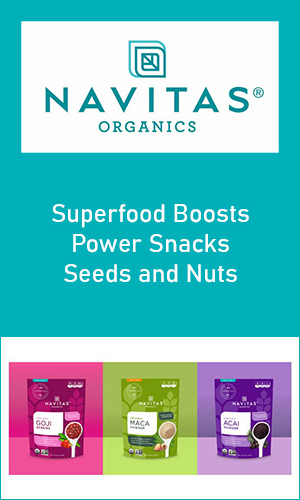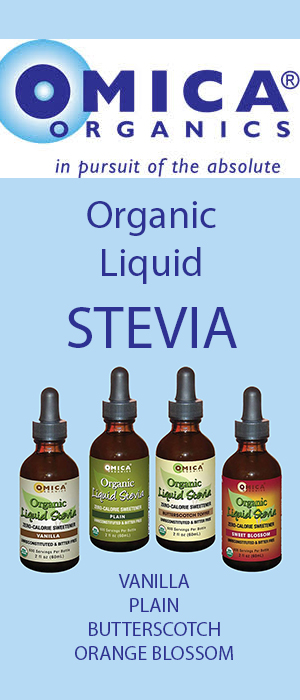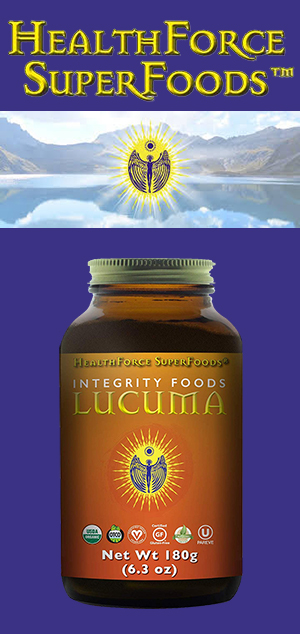- Home
- Sweeteners
- Monk Fruit Sweetener
Monk Fruit Sweetener and Lakanto Review
Intro | What is Monk Fruit? | Sweet Taste | About Lakanto | Erythritol | Benefits | Lakanto Vs Monk Fruit Stevia Xylitol | Types | How to Use | Precautions | Shop
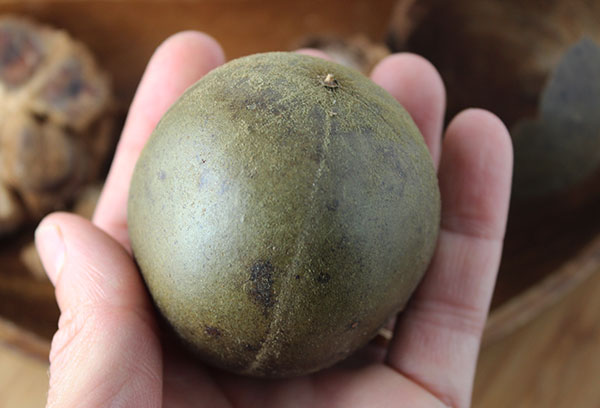
Monk fruit sweetener is a natural sugar substitute made from the super sweet luo han guo fruit. Native to parts of Southern China, mainly the Guangxi and Guangdong mountains, it was originally named after Buddhist monk populations who have used it in these regions since the 13th century.
The fruit contains a substance called mogrosides that give it a very sweet taste but with no calories or effects on blood sugar because of the way it is metabolized in the body.
Table of Contents
Intro | What is Monk Fruit? | Sweet Taste | About Lakanto | Erythritol | Benefits | Lakanto Vs Monk Fruit Stevia Xylitol | Types | How to Use | Precautions | Shop
The inside of the round green fruit is seldom consumed fresh as it is known to develop a ripe rotten taste soon after harvest. Monk fruits are consequently dried and used whole or ground into a light brown powder, similar to the consistency of lucuma fruit powder.
The dried fruit and powders, however, contain sulfuric compounds and can have a somewhat bitter astringent taste which has limited use as an all-purpose sugar additive in recipes.
Luo han guo fruit is therefore commonly prepared as concentrated extracts which removes some of these undesirable flavors as well as concentrates the sweet qualities.
What is Monk Fruit Sweetener or Luo Han Guo?
Visit Our Latest 2024 Monk Fruit Sweetener Review
Luo han guo, Siraitia grosvenorii (or Momordica grosvenorii), is a perennial vine from the gourd family. The fruit is between 1-3 inches (5-7 cm) in diameter with a yellow-green gourd-like shell and vertical light colored striations moving up and down the fruit. The fruit pulp is layered in sections that separate into small rounded pieces. When the dried pieces are chewed on they have a delicious caramel-like flavor.
The whole fruit or pulp, when dried, turns a brown color and is normally ground into a powder. In Asian countries, either the powder or whole dried peeled fruit is used to add sweetness to soups and teas.
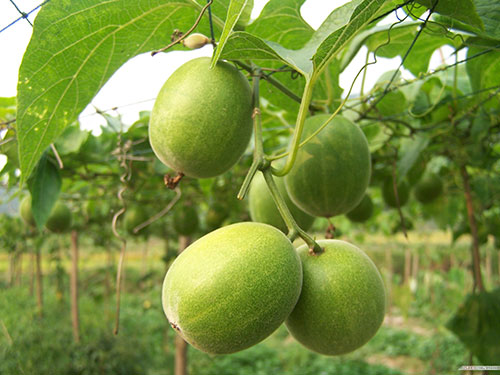
Luo han guo or monk fruit is native to remote mountainous regions near the city of Guilin, an ancient Buddhist temple site, of northeast Guangxi, China which borders Vietnam. Because the fruits are hard to cultivate, popularity was not wide spread in surrounding locations for many centuries.
Today, with the increasing demand for luo han guo and monk fruit sweeteners, like Lakanto, it is now extensively cultivated in these warmer climates. Located southwest of Guilin is the Longjiang Township, named after the luo han guo fruit, the chosen site for several factories manufacturing luo han guo extracts and products.
Where Does the Sweet Taste Come From?
The active sweetening agents in monk fruit are the triterpene glycosides or cucurbitane derivatives known as the mogrosides. There are five different mogrosides, numbered 1-5. The primary one with the greatest amount of sweetness is mogroside-5, also called esgoside. Other secondary sweet tasting compounds include neomogroside and siamenoside.
These unique sweet tasting components are not metabolized as sugars in the body and do not raise blood sugar levels like other sweeteners.
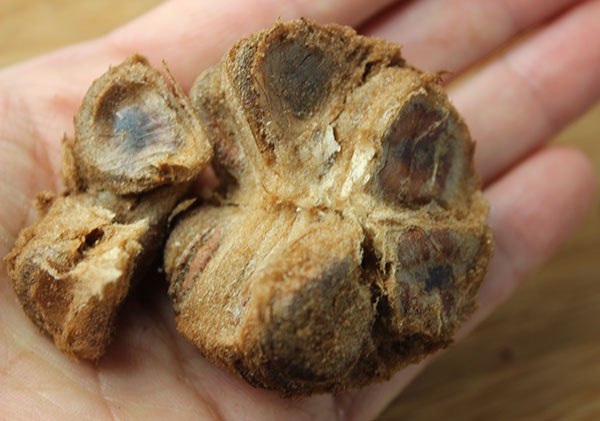
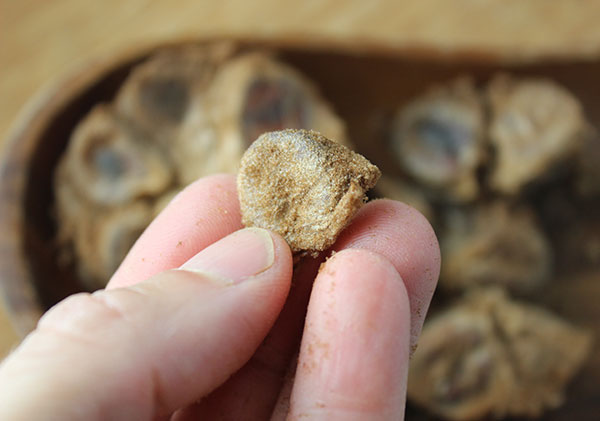
The fresh fruit is commercially processed in several different ways depending on the manufacturer. Some concentrate these triterpenes through a process called solvent extraction to achieve an 80% mogroside content, a much higher concentration of sweetness desired for use as a sugar substitute. Many methods usually involve using the freshly harvested juice or fresh fruit pulp, along with a hot water infusion. The sweet liquid is then filtered and dried to achieve a condensed super sweet powdered extract.
Technically speaking, the fruit does contain some calories and carbohydrates, coming from small amounts of fructose and glucose, but these levels are so low they are relatively insignificant. Lakanto and luo han guo sugars are therefore not good energy burning fuel sources, but very appropriate for diabetes, weight loss and obesity.
What is Lakanto Sweetener?
Today many health conscious consumers have recently started using a natural sugar made from luo han guo fruit called Lakanto. Lakanto is a blend of the monk fruit extract and the sugar alcohol erythritol. Originally developed by the Japanese company Saraya Corporation, it provides a crystalline texture similar to turbinado cane sugar and can be used as a one-to-one ratio replacement for sugar in recipes.
Lakanto has been used as an approved natural sugar substitute in Japan
for over 10 years and has received GRAS status here in the U.S. In
2007 Lakanto was introduced to the West by Donna Gates, author of the
Body Ecology Diet, who began importing a non-GMO erythritol derived version from
the Saraya Corp. Because the sugar does not increase candida overgrowth,
it is a recommend choice for those on a no-sugar diet.
Although we are personally not big fans of using concentrated sugar extracts in large amounts on a regular basis, we do use them when making the occasional dessert recipe or sweet confection. Typically we tend to go for whole food sweeteners like raw honey or green leaf stevia and have also found that we prefer using a high quality 100% luo han guo extract over Lakanto sugars.
However, using Lakanto as your sweetener of choice over other types is very relative to what you are typically used to consuming. For those of you looking to replace artificial sweeteners or white sugar, Lakanto might provide the perfect option.
With a texture that is convenient to use and measure, Lakanto is easy to substitute in many traditional recipes that call for cane sugar. It can be a much improved alternative for weight loss and diabetes because it contains zero calories and is a "non-glycemic" sweetener.
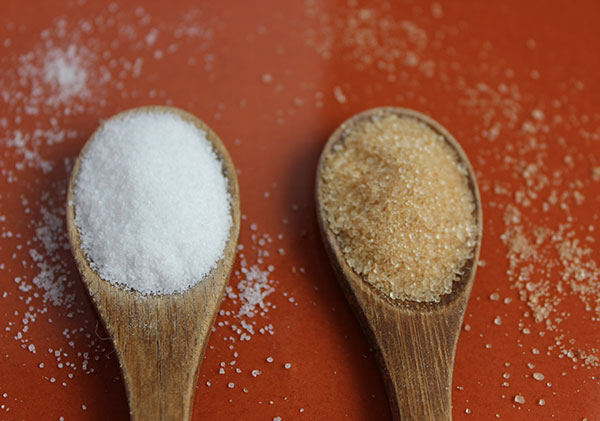
Is Lakanto a Raw Food?
Monk fruit is processed in a way that does employ the use of heat, with hot water infusions or drying methods that are above 115–118° F (45-48°C). So, Lakanto is not considered a raw product.
Lakanto, also referred to as monk fruit sweetener, is being used more and more among the average home cook following a healthy whole foods diet. Lakanto
comes in a white or golden colored sugar. The white crystals are made from an extra-high purity extract from early-harvest monk fruit to achieve a clean sugar-like color. Some say the golden variety has a caramel taste similar
to brown sugar, but we find that both white and brown Lakanto sugars
taste pretty much the same.
Because it is a fairly recent invention, research studies are somewhat limited on Lakanto for use as a dietary sugar alternative. There are however, many studies on some of the health enhancing properties of luo han guo fruit. Some of these studes demonstrate effects as an anti-inflammatory and antibacterial agent with constituents that inhibit the growth of Candida albicans and Streptococcus mutans, known to cause tooth-decay.
What is the Erythritol in Lakanto?
Lakanto sweetener is a blend of luo han guo fruit extract and erythritol. Erythritol is a fermented sugar alcohol derived from corn. The erythritol in Lakanto is specifically derived from non-GMO corn. Erythritol, like xylitol, is naturally found in some fermented foods as well as fruits and mushrooms.
When the sugars in corn are fermented, rather than hydrogenated, they apparently do not produce the same negative side-effects that other sugar alcohols may have on the digestive system, such as loose stools, gas and bloating issues. Most of the erythritol content in Lakanto is excreted through the urine and feces with about 10% entering the large intestine. According to Donna Gates, this remaining erythritol turns into harmless gases and short chain fatty acids in the colon.
Erythritol is a non-caloric sweetener that is not metabolized for energy and does not affect blood sugar or cause tooth decay. When blended with monk fruit extract, a sugar like consistency is created.
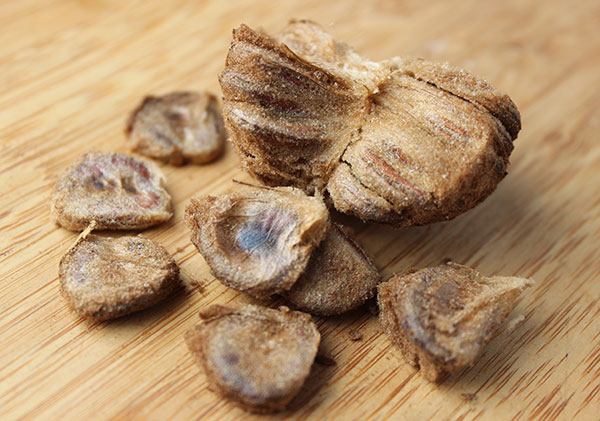
Benefits of Monk Fruit Sweetener
High in Antioxidant Mogroside Triterpenes
Monk fruit sweetener, especially concentrated extracts, are notably high in the mentioned mogrosides triterpenes which have been shown to exhibit strong antioxidant, anti-inflammatory and blood glucose controlling activity.
In a 2013 study published in the Brazilian Journal of Medical and Biological Research analyzing the antioxidant effect of mogrosides against oxidative stress, results indicated that "mogrosides might exert their antioxidant effect by reducing intracellular ROS and regulating expression of genes involved in glucose metabolism."
Mogroside-5, the sweetest component of monk fruit, has been shown in a 2009 study to "provide a positive health impact on stimulating insulin secretion."
In another study conducted, aiming to assess the anti-inflammatory properties of mogrosides, it was shown that "the anticancer and antidiabetic effects of M. grosvenori may result in part from its anti-inflammatory activity."
Traditionally used by the Chinese to treat inflamed conditions and excess heat, luo han guo is consumed in teas and beverages to cool the body, offering relief from hot weather, fevers as well as inflammation. It is also consumed as a natural remedy for coughs, sore throats and for breaking up phlegm and excess mucus.
Good For Candida Overgrowth or Autoimmune Issues
Lakanto, as well as monk fruit sweeteners and extracts, are another option to use over stevia for those on a low sugar diet aimed at treating candida overgrowth or autoimmune conditions.
A bioactive component in luo han guo fruit, called siraitiflavandiol, also shows potential benefits for dental issues and things like periodontal disease and tooth decay. It was isolated in 2009 and studied for use as an antibacterial compound shown to inhibit "the growth of oral bacterial species Streptococcus mutans, Porphyromonas gingivalis, and yeast Candida albicans." (Source)
In another 2013 study testing Siraitia grosvenorii fruit extracts on mice with physical fatigue, results showed "significant anti-fatigue effects" in a dose-dependent manner.
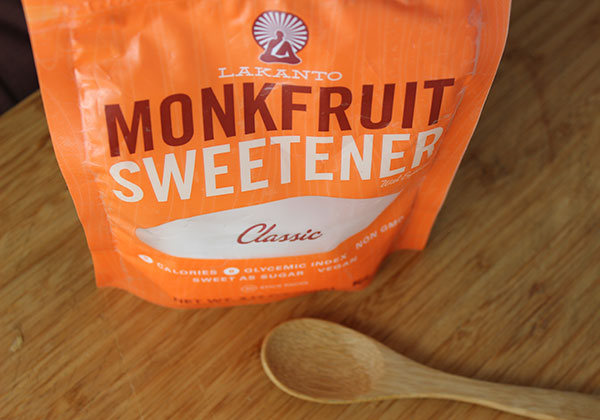
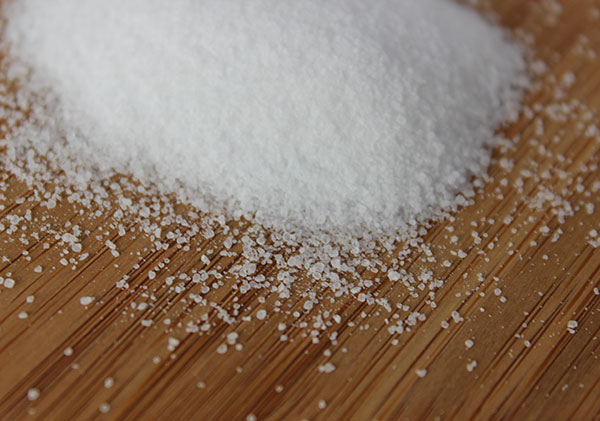
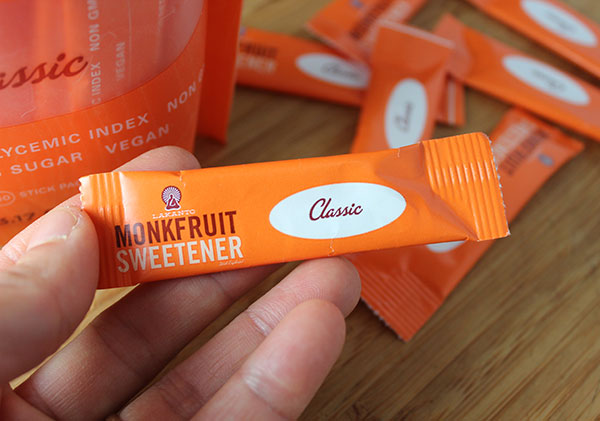
Lakanto Vs Monk Fruit Powder, Stevia or Xylitol
Luo han guo extracts and lakanto sugars are significant natural sugar substitutes for diabetics or those on a low calorie diet. Monk fruit sweeteners are often compared to stevia, another no calorie sweetener commonly recommended to diabetics because it does not raise blood sugar levels.
Stevia, however, is less convenient for use as a crystalline sugar replacement with the whole green powder being somewhat like the consistency of luo han guo dried fruit powder. Lakanto is a better sugar alternative over stevia or straight monk fruit powder because it is closer to a sugar-like texture and is easy to use in recipes.
Lakanto is also considered a healthier option over xylitol sugar. Although xylitol, also a sugar alcohol like erythritol, has been proven helpful as an alkaline low calorie sweetener, it is known to cause gas and laxative effects when consumed in concentrated amounts, like desserts. Lakanto does not cause digestive problems and is also a zero glycemic sweetener.
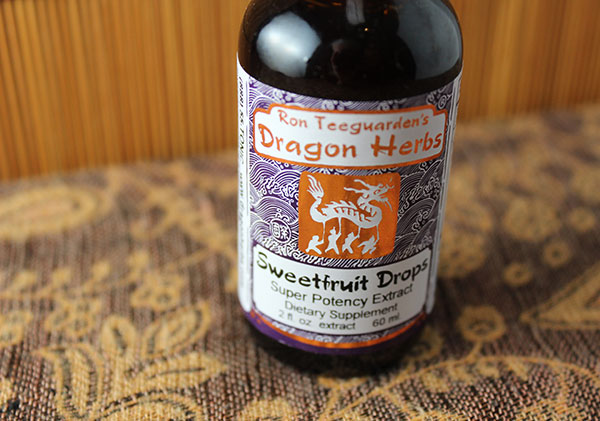
Types of Monk Fruit Sweetener
Dried Monk Fruit - Whole or powdered monk fruit is available online or in Asian markets. These forms are usually dried immediately after harvesting.
Lakanto - Is a non-GMO project verified (not certified organic) blend of luo han guo fruit extract and erythritol. It is produced by the Saraya Corporation in Japan for the company Body Ecology, owned by Donna Gates. It comes in golden (light brown) and classic (white) sugar crystals.
Dragon Herbs Sweetfruit Drops - This is a straight luo han guo extract containing glycerin and water. It is available in 2fl oz size dropper bottles. Has a delicious flavor closer to the taste of the dried fruit.
Jarrow LoHan Sweet - A powder made with xylitol and MogroPure® (Momordica grosvenorii, lo han fruit juice concentrate), Inulin-FOS and silicon dioxide.
NuNaturals Pure Liquid Lo Han Supreme - Contains luo han guo fruit extract, vegetable glycerine, 20% pure grain alcohol and water.
Monk Fruit In The Raw - Made from monk fruit extract and maltodextrin (created from GMO-corn). This is the monk fruit sweetener brand promoted by Dr. Oz. This company is owned by the Cumberland Packing Corporation, the same company who makes Sweet'N Low, the artificial saccharin sweetener. (Source)
Norbu Sweetener - This is an Australian brand, similar to Lakanto, made from erythritol (not non-GMO certified) and monk fruit extract.
There are many "not so healthy" brands and artificial sweetener manufacturers adding monk fruit extract with other ingredients to their product lines. While these choices might be an upgrade over saccharin and aspartame, it is good to be aware and read your labels.
Our personal favorite monk fruit sweeteners are Lakanto and Dragon Herbs Sweetfruit Drops. You can also make your own liquid extract from dried monk fruit pieces, much the same way you would make a liquid stevia recipe.
How to Use
Monk fruit sweeteners, like Lakanto sugar, can be used in a one-to-one replacement for white sugar in any recipe. We like to use it in raw desserts, like lemon bars and cookie recipes, usually in combination with other natural sweeteners to help reduce the glycemic index.
Lakanto sweetener does not absorb moisture, even under humidity and high heat, so it won’t harden with age and can be stored for long periods of time.
Luo han guo extracts, like Dragon Herbs Sweetfruit Drops, can be used in teas, drinks or likewise combined with other sweeteners in recipes.
Precautions:
Monk fruit sweeteners, like Lakanto or luo han guo extracts, are considered safe to use with no toxic side-effects. Consult your nutritionist or dietitian before using monk fruit sweetener if pregnant, nursing, taking prescribed medications or if you have a serious medical condition.
Shop Related Products (About Affiliates & Amazon Associate Paid Links)
Affiliate Disclaimer: This section contains affiliate product links. If you make a purchase through our recommended links, we receive a small commission at no additional cost to you. Thanks for the support.

